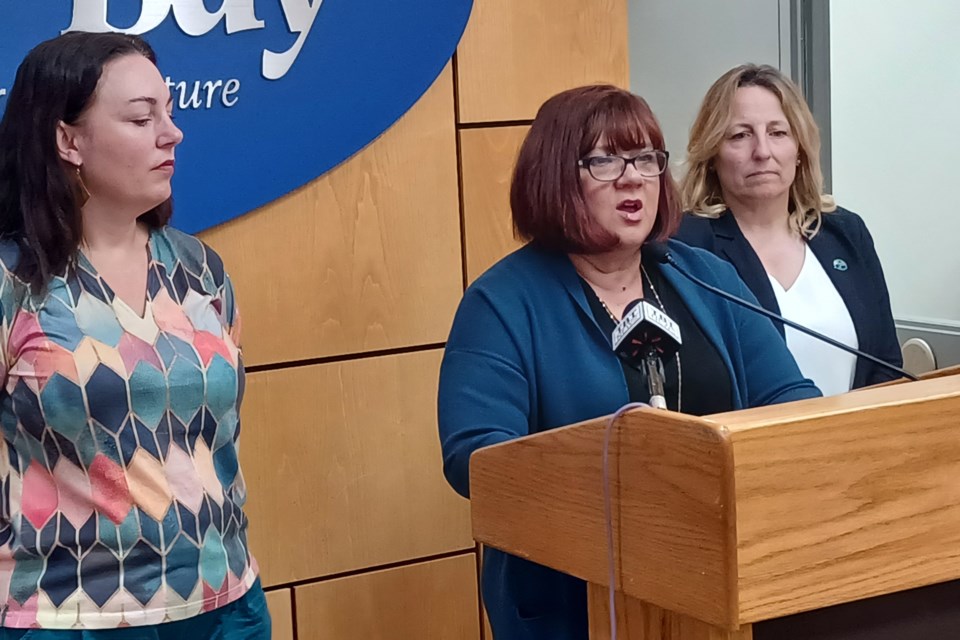THUNDER BAY — Meetings with provincial officials this week left Coun. Kristen Oliver feeling optimistic, she said Thursday.
“We had really great meetings and I would say this was one of the conferences in the last little bit where I left the room feeling heard, feeling collaboration, feeling there was engagement,” said Oliver, who chairs the city’s intergovernmental affairs committee.
“The discussions certainly had me feeling pretty optimistic.”
Asked what was the top issue discussed with the province at the Association of Municipalities of Ontario conference, Oliver said “It is hard to pick just one, because they’re all intertwined.”
“We have homelessness and we have people struggling on the street. Of course, we want to provide some support.
“And when you do that, then that helps with your growth initiatives.”
Tackling social problems like homelessness fosters a sense of community, she said.
“And we’re also looking at how we would get those health-care resources into our communities (to) support not only the people here but also in the region.”
Thunder Bay is not only a regional hub with the local Health Sciences Centre, but also “an education hub,” she said, adding that justice and policing are important as well.
Thunder Bay is feeling pressure in “having to increase our policing budget every year because we’re seeing more and more (costs) downloaded onto communities,” Oliver said.
“So to say there is one (top) issue, I think, would be really hard because they’re so intertwined.”
Among other items raised with Ontario officials were possible transfer of Lakehead Psychiatric Hospital property to the city, more funding for the Thunder Bay District Health Unit, addressing the problem of “guns and gangs” crime, and establishing a forensic pathology lab in the city.
Thunder Bay hasn’t had a forensic pathology unit in years, and the regional hospital decided in 2023 to cease performing medicolegal autopsies for the Ontario coroner’s service.
The city wants to reverse that and re-establish a forensic pathology lab to serve the region, and it used some of its time at the AMO conference to speak with provincial officials about it.
“The government's still in the middle of assessing the need for (a unit in) Thunder Bay, but recognizes that there is a need.,” Coun. Kasey Etreni said.
“They just want to see the level of need that we require at this time. We're expecting — or I'm expecting — that we're going to probably hear within the next year more detailed, more firm information.”
One problem with autopsies being performed elsewhere is a drain on police time as someone must accompany the deceased in transport to Toronto, Etreni said.
Asked where a forensic pathology lab could be located, Etreni said it should be at a place other than the hospital.
AMO conference delegates from across the province were talking about “homelessness, addictions and the opioid crisis,” Oliver told Newswatch.
“We've had many conversations about next steps, how do we mitigate through these types of situations, recognizing that there are court decisions in place that are impacting municipalities’ ability to have some autonomy on where we can relocate people that are living in tents or remove people from public spaces or transition people to another public space area,” she said.
“It's nice to have those conversations and to learn more from our colleagues.”
Oliver said the city tried to persuade provincial officials “to look at communities in northern Ontario a little bit more differently” than southern cities that have more options and resources for tackling problems like homelessness and lack of affordable housing.
Big cities in the south “have a different opportunity to address homelessness in a much different way than we do here in the city, recognizing we rely on our DSSAB,” she said, referring to the District of Thunder Bay Social Services Administration Board.
Some people in Thunder Bay “are having a hard time fitting into the more traditional short-term stays at the Shelter House and Salvation Army due to varying factors,” said Coun. Shelby Ch’ng.
“So we were hoping that we could maybe inspire some dollars from the Ministry of (Health) and hopefully get some funding in that regard.”
